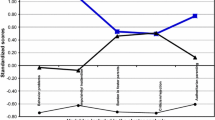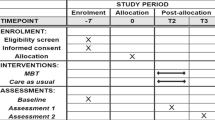Abstract
Family foster care is a valuable, but vulnerable type of out-of-home placement. Adequate support of foster parents is an important factor for placement success. This requires an accurate assessment of the support needs of foster parents. This paper focuses on the support needs of foster mothers concerning difficult behavior of the child and their own parenting behavior. Data were gathered from 282 foster mothers. 46 % of the foster mothers needed support on at least one behavior of the child, 40 % on at least one parenting behavior. Foster mothers, who felt less competent to deal with the child, expressed a higher support need on both areas. A high support need concerning difficult behaviors was further predicted by the foster mother’s age, the type of foster care, and the number of biological children. A high support need concerning parenting was further predicted by the quality of support by the foster care worker and the number of foster children. Careful monitoring of all types of foster care situations with special attention to problem behaviors and how to handle them could make this type of out-of-home-placement more effective.
Similar content being viewed by others

References
Acuna, E., & Rodriguez, C. (2004). The treatment of missing values and its effect in the classifier accuracy. In D. Banks, L. House, F. R. McMorris, P. Arabie, & W. Gaul (Eds.), Classification, clustering and data mining applications (pp. 639–648). Berlin: Springer-Verlag.
Agentschap Jongerenwelzijn (2010). Evolutie van het aantal begeleide jongeren naar begeleidingsjaar en soort voorziening. Resource document. Agentschap Jongerenwelzijn. http://wvg.vlaanderen.be/jongerenwelzijn/PDF/OB_Cijfermateriaal/kerncijferrapporten2011/evolutie_7.pdf. Accessed 22 Feb 2012.
Armsden, G., Pecora, P. J., Payne, V. H., & Szatkiewicz, J. P. (2000). Children placed in long-term foster care: An intake profile using the child behavior checklist/4-18. Journal of Emotional and Behavioral Disorders, 8, 49–64.
Ashford, J., Smit, F., Van Lier, P. A. C., Cuijpers, P., & Koot, H. M. (2008). Early risk indicators of internalizing problems in late childhood: A 9-year longitudinal study. Journal of Child Psychology and Psychiatry, 49, 774–780.
Bastiaensen, P. (2001). Belaste pleegouders en verscheurde pleegkinderen? Ph D Dissertation, Katholieke Universiteit Nijmegen, Nijmegen.
Bronselaer, J., Vandezande, V., & Verreth, K. (2011). Vlaamse pleegzorgers in beeld. Brussel: Koning Bouwdewijnstichting.
Brown, J., & Calder, P. (1999). Concept-mapping the challenges faced by foster parents. Children and Youth Services Review, 21, 481–495.
Chamberlain, P., Moreland, S., & Reid, K. (1992). Enhanced services and stipends for foster parents: Effects on retention rates and outcomes for children. Child Welfare, 71, 387–401.
Chamberlain, P., Price, J. M., Reid, J. B., Landsverk, J., Fisher, P. A., & Stoolmiller, M. (2006). Who disrupts from placement in foster and kinship care? Child Abuse and Neglect: The International Journal, 30, 409–424.
Chipungu, S. S., & Bent-Goodley, T. B. (2004). Meeting the challenges of contemporary foster care. The Future of Children Journal, 14(1), 75–93.
Clausen, J. M., Landsverk, J., Ganger, W., Chadwick, D., & Litrownik, A. (1998). Mental health problems of children in foster care. Journal of Child and Family Services, 7, 283–296.
Crepaldi, C., Pasquinelli, S., Castegnaro, C., Naaf, S., Pereira, M. T. S., Camus, P., et al. (2011). Parenting support in Europe: A comparative study of policies and practices. Rome: Instituto per la ricerca sociale.
Daniel, E. (2011). Gentle iron will: Foster parents’ perspectives. Children and Youth Services Review, 33, 910–917.
Denby, R., Rindfleisch, N., & Bean, G. (1999). Predictors of foster parents’ satisfaction and intent to continue to foster. Child Abuse and Neglect, 23, 287–303.
Fees, B. S., Stockdale, D. F., & Crase, S. J. (1998). Satisfaction with foster parenting: Assessment one year after training. Children and Youth Services Review, 20, 347–363.
Fisher, T., Gibbs, I., Sinclair, I., & Wilson, K. (2000). Sharing the care: The qualities sought of social workers by foster carers. Child and Family Social Work, 5, 225–233.
Holland, P., & Gorey, K. (2004). Historical, developmental, and behavioral factors associated with foster care challenges. Child and Adolescent Social Work Journal, 21, 117–135.
Hudson, P., & Levasseur, K. (2002). Supporting foster parents: Caring voices. Child Welfare, 81, 853–878.
Johnson, P. S., Yoken, C., & Voss, R. (1995). Family foster care placement: The child’s perspective. Child Welfare, 14, 959–974.
Jones, G., & Morissette, P. J. (1999). Foster parent stress. Canadian Journal of Counselling, 33, 13–27.
Keller, T. E., Wetherbee, K., Le Prohn, N. S., Payne, V., Sim, K., & Lamont, E. R. (2001). Competencies and problem behaviors of children in family foster care: Variations by kinship placement status and race. Children and Youth Services Review, 23, 915–940.
Kraus, J. (1971). Predicting success of foster placements for school-age children. Social Work, 16, 63–72.
Loeffen, M. M., & Portengen, M. C. (1998). Opvoedingsondersteuning in de pleegzorg. Een behoeftepeiling bij 75 pleegzorgadressen. Tijdschrift voor Orthopedagogiek, 37, 200–210.
Mayers-Pasztor, E. (1987). Model approach to partnerships in parenting/group preparation and selection of foster and/or adoptive families. Atlanta: Child Welfare Institute.
McMillen, J., Zima, B., Scott, L., Auslander, W., Munson, M., Ollie, M., et al. (2005). Prevalence of psychiatric disorders among older youths in the foster care system. Journal of the American Academy of Child and Adolescent Psychiatry, 44, 88–95.
Mitchell, M. B., Kuczynski, L., Tubbs, C. Y., & Ross, C. (2010). We care about care: Advice by children in care for children in care, foster parents and child welfare workers about the transition into care. Child and Family Social Work, 15, 176–185.
Murray, L., Tarren-Sweeney, M., & France, K. (2011). Foster carer perceptions of support and training in the context of high burden of care. Child and Family Social Work, 16, 149–158.
Oosterman, M., Schuengel, C., Slot, N. W., Bullens, R. A. R., & Doreleijers, T. A. H. (2007). Disruptions in foster care: A review and meta-analysis. Children and Youth Services Review, 29, 53–76.
Peters, J. (2005). True ambivalence: Child welfare workers’ thoughts, feelings and beliefs about kinship foster care. Children and Youth Services Review, 27, 595–614.
Pleegzorg Vlaanderen (2010). De pleegzorgregistratie 2010. Resource document. Pleegzorg Vlaanderen.http://www.pleegzorgvlaanderen.be/files/pages/files/Registratierapport_2010.pdf. Accessed 22 Feb 2012.
Rhodes, K. W., Orme, J. G., & Buehler, C. (2001). A comparison of family foster parents who quit, consider quitting, and plan to continue fostering. The Social Service Review, 75, 84–114.
Rhodes, K. W., Orme, J. G., & McSurdy, M. (2003). Foster parents’ role performance responsibilities: Perceptions of foster mothers, fathers, and workers. Children and Youth Services Review, 25, 935–964.
Scannapieco, M., & Hegar, R. L. (2002). Kinship care providers: Designing an array of supportive services. Child and Adolescent Social Work Journal, 19, 315–327.
Stanley, N. (2007). Young people’s and careers’ perspectives on the mental health needs of looked-after adolescents. Child and Family Social Work, 12, 258–267.
Stovall, K. C., & Dozier, M. (2000). The development of attachment in new relationships: Single subject analyses for 10 foster infants. Development and Psychopathology, 12, 133–156.
Strijker, J. (2010). Foster care in the Netherlands: Correlates of placement breakdown and successful placement. In E. Fernandez & R. P. Barth (Eds.), How does foster care work? International evidence on outcomes (pp. 82–84). London: Jessica Kingsley.
Strijker, J., & Zandberg, T. J. (2004). Over-Leven in de pleegzorg. Pedagogiek, 24, 230–245.
Van Holen, F. (2005). Ondersteuningsbehoeften van pleegouders in Vlaanderen. Tijdschrift voor Orthopedagogiek, 44, 472–483.
Van Holen, F., & Vanderfaeillie, J. (2008). Vragenlijst Ondersteuningsbehoeften en Tevredenheid: Pleegouders. Brussel: Opvang.
Van Holen, F., Vanderfaeillie, J., & Eerdekens, H. (2010). Wat vinden pleegouders ervan? Ondersteuningsbehoeften van pleegouders in gezinsondersteunende pleegzorg. Tijdschrift voor Orthopedagogiek, Kinderpsychiatrie en Klinische Kinderpsychologie, 35, 92–101.
Van Yperen, T. (2010). 55 vragen over effectiviteit: antwoorden voor de jeugdzorg. Utrecht: Nederlands Jeugdinstituut.
Vanderfaeillie, J., & Van Holen, F. (2010). Het verloop van pleeggezinplaatsingen. In P. Van den Bergh & T. Weterings (Eds.), Pleegzorg in perspectief: Ontwikkelingen in theorie en praktijk (pp. 177–193). Assen: Van Gorcum.
Vanderfaeillie, J., Van Holen, F., & Coussens, S. (2008). Why do foster care placements break down? A study into the factors influencing foster care placement breakdown in Flanders. International Journal of Child and Family Welfare, 11, 77–87.
Vanderfaeillie, J., Van Holen, F., Trogh, L., & Andries, C. (2012). The impact of foster children’s behavioral problems on Flemish foster mothers’ parenting behavior. Child and Family Social Work, 17, 34–42.
Wilson, K. (2006). Can foster carers help children resolve their emotional and behavioral difficulties? Clinical Child Psychology and Psychiatry, 11, 495–511.
Wilson, K., Fyson, R., & Newstone, S. (2007). Foster fathers: Their experiences and contributions to fostering. Child and Family Social Work, 12, 22–31.
Author information
Authors and Affiliations
Corresponding author
Rights and permissions
About this article
Cite this article
Vanschoonlandt, F., Van Holen, F., Vanderfaeillie, J. et al. Flemish Foster Mothers’ Perceptions of Support Needs Regarding Difficult Behaviors of Their Foster Child and Their Own Parental Approach. Child Adolesc Soc Work J 31, 71–86 (2014). https://doi.org/10.1007/s10560-013-0310-8
Published:
Issue Date:
DOI: https://doi.org/10.1007/s10560-013-0310-8



